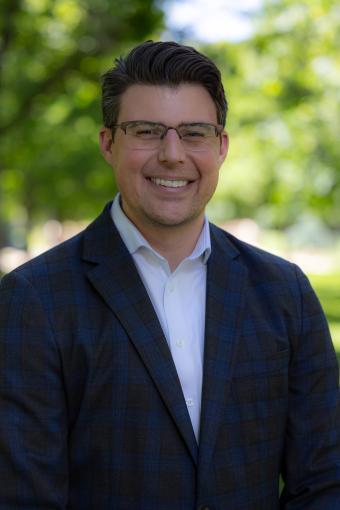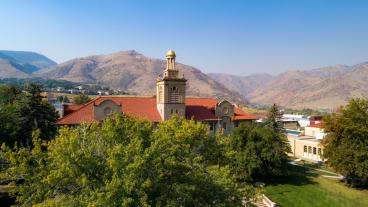Mines professor wins DOE Early Career Research Program Award
C. Michael McGuirk, assistant professor of chemistry, will conduct research on atomic-level studies of flexible sponge-like structures used in separations

C. Michael McGuirk, assistant professor of chemistry at Colorado School of Mines, has been honored with an U.S. Department of Energy Early Career Award. The award covers five years of research with funding totaling $875,000.
McGuirk’s research focuses on separations science and developing a better understanding of how to separate materials using less energy.
“This is something that we’ve been working on for a while, and for that to be recognized with this award, it has impact,” McGuirk said. “For our lab, it means quite a bit in terms of providing long-term stability to do the research that we need to do, because what we’re studying, we need to be able to plan and do our research for years at a time. This allows us to securely make that kind of cognitive and physical investment.”
Separating chemicals and minerals consumes a very large amount of energy globally, McGuirk said. For everything from the molecules we use to make plastics to the minerals used in electronics, industries rely on energy intensive separations to create products and run processes. One way to reduce thisi energy consumption is through adsorptive separation, where mixtures are passed through a sponge-like material and the different components of the mixture are separated from one another.
While the concept of adsorptive separation is not new, McGuirk is working on changing the kind of sponge-like material used in this process. Most often, the separation happens as the mixture moves through a rigid, non-moving structure. But what if this structure was flexible and could adapt to the mixture? McGuirk said the idea is motivated by biological structures, which readily and revissibly adapt to their environment and to molecular cues. Ideally, a flexible structure could be used for different kinds of mixtures, adapting itself to separate molecules depending on their individual characteristics. This would eliminate the need for intensive nanoscale engineering and ultimately lead to more effective separations that require less energy.
McGuirk says that adaptable materials are usually created serendipitously, but he and his research group hope to further their intentional design by better understanding what happens at the atomic level and how different materials can adapt to small molecules.
“To have the DOE recognize the approach we’re taking to study this topic really legitimizes our research,” he said. “We hope that we can build a scientific foundation that other scientists can use to push out something that can really impact energy consumption in the world.”
McGuirk is collaborating on the project with Ryan Klein, a researcher at the National Renewable Energy Laboratory. Klein is a specialist in X-ray crystallography, particularly at synchrotrons, a type of particle accelerator, and will help illuminate the atomic-level structure of these complex materials and their interactions with mixtures.
The DOE Early Career Research Program supports the research of more than 80 outstanding scientists early in their careers. Awards are given to untenured, tenure-track assistant or associate professors at U.S. academic institutions and full-time employees at DOE national laboratories or Office of Science user facilities.




